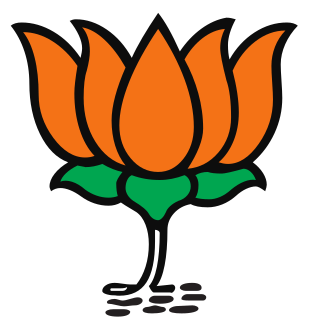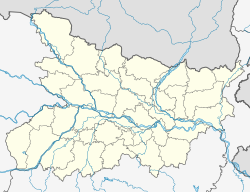
India, officially the Republic of India, is a country in South Asia. It is the seventh-largest country by area, the second-most populous country, and the most populous democracy in the world. Bounded by the Indian Ocean on the south, the Arabian Sea on the southwest, and the Bay of Bengal on the southeast, it shares land borders with Pakistan to the west; China, Nepal, and Bhutan to the north; and Bangladesh and Myanmar to the east. In the Indian Ocean, India is in the vicinity of Sri Lanka and the Maldives; its Andaman and Nicobar Islands share a maritime border with Thailand, Myanmar and Indonesia.

India is the second most populated country in the world with a sixth of the world's population. According to the 2019 revision of the World Population Prospects the population stood at 1,352,642,280. In January 2022, India's population crossed 1.41 billion.

Jawaharlal Nehru was an Indian anti-colonial nationalist, secular humanist, social democrat, and author who was a central figure in India during the middle third of the 20th century. Nehru was a principal leader of the Indian nationalist movement in the 1930s and 1940s. Upon India's independence in 1947, he served as the country's prime minister for 17 years. Nehru promoted parliamentary democracy, secularism, and science and technology during the 1950s, powerfully influencing India's arc as a modern nation. In international affairs, he steered India clear of the two blocs of the Cold War. A well-regarded author, his books written in prison, such as Letters from a Father to His Daughter (1929), An Autobiography (1936), and The Discovery of India (1946), have been read around the world.

Mumbai is the capital city of the Indian state of Maharashtra. According to the United Nations, as of 2018, Mumbai is the second-most populous city in India after Delhi and the eighth-most populous city in the world with a population of roughly 2 crore. As per the Indian government population census of 2011, Mumbai was the most populous city in India with an estimated city proper population of 1.25 crore (12.5 million) living under the Municipal Corporation of Greater Mumbai. Mumbai is the centre of the Mumbai Metropolitan Region, the sixth most populous metropolitan area in the world with a population of over 2.3 crore. Mumbai lies on the Konkan coast on the west coast of India and has a deep natural harbour. In 2008, Mumbai was named an alpha world city. It has the highest number of millionaires and billionaires among all cities in India. Mumbai is home to three UNESCO World Heritage Sites: the Elephanta Caves, Chhatrapati Shivaji Maharaj Terminus, and the city's distinctive ensemble of Victorian and Art Deco buildings designed in the 19th and 20th centuries.

Maharashtra (; Marathi: [məharaːʂʈɾə], abbr. MH or Maha, is a state in the western and central peninsular region of India occupying a substantial portion of the Deccan Plateau. Maharashtra is the second-most populous state in India as well as the second-most populous country subdivision in the world. It was formed on 1 May 1960 by splitting the bilingual Bombay State, which had existed since 1956, into majority Marathi-speaking Maharashtra and Gujarati-speaking Gujarat. Hence Maharashtra is a Marathi linguistic state. As the home of the Marathi people, Maharashtra is divided into 6 divisions and 36 districts, with the state capital being Mumbai, also the most populous urban area in India and Nagpur serving as the winter capital. The Godavari and the Krishna are the two major rivers in the state. Marathi is the most widely spoken language and is also the only official language of the state. The forest cover in the state is 16.47% of the state's geographical area. Out of the total cultivable land in Maharashtra, about 60% is used for grain crops with Jowar being the dominating crop.

Tamil Nadu is a state in southern India. Its capital and largest city is Chennai. Lying in the southern-most part of the Indian subcontinent, Tamil Nadu is bordered by the Indian union territory of Puducherry and the states of Kerala, Karnataka, and Andhra Pradesh, as well as an international maritime border with Sri Lanka. The state is bounded by the Western Ghats in the west, the Eastern Ghats in the north, the Bay of Bengal in the east, the Gulf of Mannar and Palk Strait to the south-east, and the Indian Ocean in the south. The official language is Tamil, one of the longest-surviving classical languages in the world.

The East India Company (EIC) was an English, and later British, joint-stock company founded in 1600. It was formed to trade in the Indian Ocean region, initially with the East Indies, and later with Qing China. The company seized control of large parts of the Indian subcontinent, colonised parts of Southeast Asia and Hong Kong after the First Opium War, and maintained trading posts and colonies in the Persian Gulf Residencies.

The Bharatiya Janata Party is one of two major political parties in India, along with the Indian National Congress. It has been the ruling political party of the Republic of India since 2014. The BJP is a right-wing party, and its policy has historically reflected Hindu nationalist positions. It has close ideological and organisational links to the much older Rashtriya Swayamsevak Sangh (RSS). As of 2020, it is the country's largest political party in terms of representation in the national parliament and state legislatures.

The Indian National Congress, colloquially the Congress Party but often simply Congress, is a political party in India with widespread roots. Founded in 1885, it was the first modern nationalist movement to emerge in the British Empire in Asia and Africa. From the late 19th century, and especially after 1920, under the leadership of Mahatma Gandhi, Congress became the principal leader of the Indian independence movement. Congress led India to independence from the United Kingdom, and powerfully influenced other anti-colonial nationalist movements in the British Empire. Due to its enduring history, the Congress is often called the "grand old party".

Bhimrao Ramji Ambedkar was an Indian jurist, economist, and social reformer who fought economic and social discrimination against the untouchables in India's Hindu society, and who later renounced Hinduism and inspired the Dalit Buddhist movement. Ambedkar served as chairman of the drafting committee of the Constitution of India, and Minister of Law and Justice in the first cabinet of Jawaharlal Nehru from 1947 to 1951. He is also referred to by the honorific Babasaheb.

Subhas Chandra Bose was an Indian nationalist whose defiance of British authority in India made him a hero among Indians, but his wartime alliances with Nazi Germany and Fascist Japan left a legacy vexed by authoritarianism and anti-Semitism. The honorific Netaji was first applied to Bose in Germany in early 1942—by the Indian soldiers of the Indische Legion and by the German and Indian officials in the Special Bureau for India in Berlin. It is now used throughout India.

Uttar Pradesh is a state in northern India. With over 200 million inhabitants, it is the most populated state in India as well as the most populous country subdivision in the world. It was established in 1950 after India had become a republic. It was a successor to the United Provinces (UP) during the period of the Dominion of India (1947–1950), which in turn was a successor to the United Provinces (UP) established in 1935, and eventually of the United Provinces of Agra and Oudh established in 1902 during the British Raj. The state is divided into 18 divisions and 75 districts, with the state capital being Lucknow, and Allahabad serving as the judicial capital. On 9 November 2000, a new state, Uttaranchal, was created from Uttar Pradesh's western Himalayan hill region. The two major rivers of the state, the Ganges and its tributary Yamuna, meet at the Triveni Sangam in Allahabad, a Hindu pilgrimage site. Other notable rivers are Gomti and Saryu. The forest cover in the state is 6.1% of the state's geographical area. The cultivable area is 82% of total geographical area and net area sown is 68.5% of cultivable area.

The Constitution of India is the supreme law of India. The document lays down the framework that demarcates fundamental political code, structure, procedures, powers, and duties of government institutions and sets out fundamental rights, directive principles, and the duties of citizens. It is the longest written constitution, in comparison to any other country.

India is a federal union comprising 28 states and 8 union territories, for a total of 36 entities. The states and union territories are further subdivided into districts and smaller administrative divisions.

Narendra Damodardas Modi is an Indian politician serving as the 14th and current prime minister of India since 2014. Modi was the chief minister of Gujarat from 2001 to 2014 and is the Member of Parliament from Varanasi. He is a member of the Bharatiya Janata Party (BJP) and of the Rashtriya Swayamsevak Sangh (RSS), a right-wing Hindu nationalist paramilitary volunteer organisation. He is the first prime minister to have been born after India's independence in 1947 and the second prime minister not belonging to the Indian National Congress to have won two consecutive majorities in the Lok Sabha, or lower house of Indian of parliament.

The Government of India, also known as the Central or Union Government or simply the Centre, is the Union government created by the Constitution of India as the legislative, executive and judicial authority to govern the union of twenty eight states and eight union territories. The seat of the government is located in New Delhi, Delhi.

The National Flag of India is a horizontal rectangular tricolour of India saffron, white and India green; with the Ashoka Chakra, a 24-spoke wheel, in navy blue at its centre. It was adopted in its present form during a meeting of the Constituent Assembly held on 22 July 1947, and it became the official flag of the Dominion of India on 15 August 1947. The flag was subsequently retained as that of the Republic of India. In India, the term "tricolour" almost always refers to the Indian national flag. The flag is based on the Swaraj flag, a flag of the Indian National Congress designed by Pingali Venkayya.

Republic Day is a public holiday in India, when the country marks and celebrates the date on which the Constitution of India came into effect on 26 January 1950, replacing the Government of India Act 1935 as the governing document of India and thus, turning the nation into a newly formed republic. The day also marks the transition of India from an autonomous Commonwealth realm with British Monarch as nominal head of the Indian Dominion, to a fully sovereign republic in the Commonwealth of Nations with the President of India as the nominal head of the Indian Union.

The British Raj was the rule of the British Crown on the Indian subcontinent from 1858 to 1947. The rule is also called Crown rule in India, or direct rule in India. The region under British control was commonly called India in contemporaneous usage and included areas directly administered by the United Kingdom, which were collectively called British India, and areas ruled by indigenous rulers, but under British paramountcy, called the princely states. The region was sometimes called the Indian Empire, though not officially.
Air India is the flag carrier airline of India, headquartered at New Delhi. It is owned by Talace Private Limited, a Special-Purpose Vehicle (SPV) of Tata Sons, after Air India Limited's former owner, the Government of India, completed the sale. Air India operates a fleet of Airbus and Boeing aircraft serving 102 domestic and international destinations. The airline has its hub at Indira Gandhi International Airport, New Delhi, alongside several focus cities across India. Air India is the largest international carrier out of India with an 18.6% market share. Over 60 international destinations are served by Air India across four continents. The airline became the 27th member of Star Alliance on 11 July 2014.

















